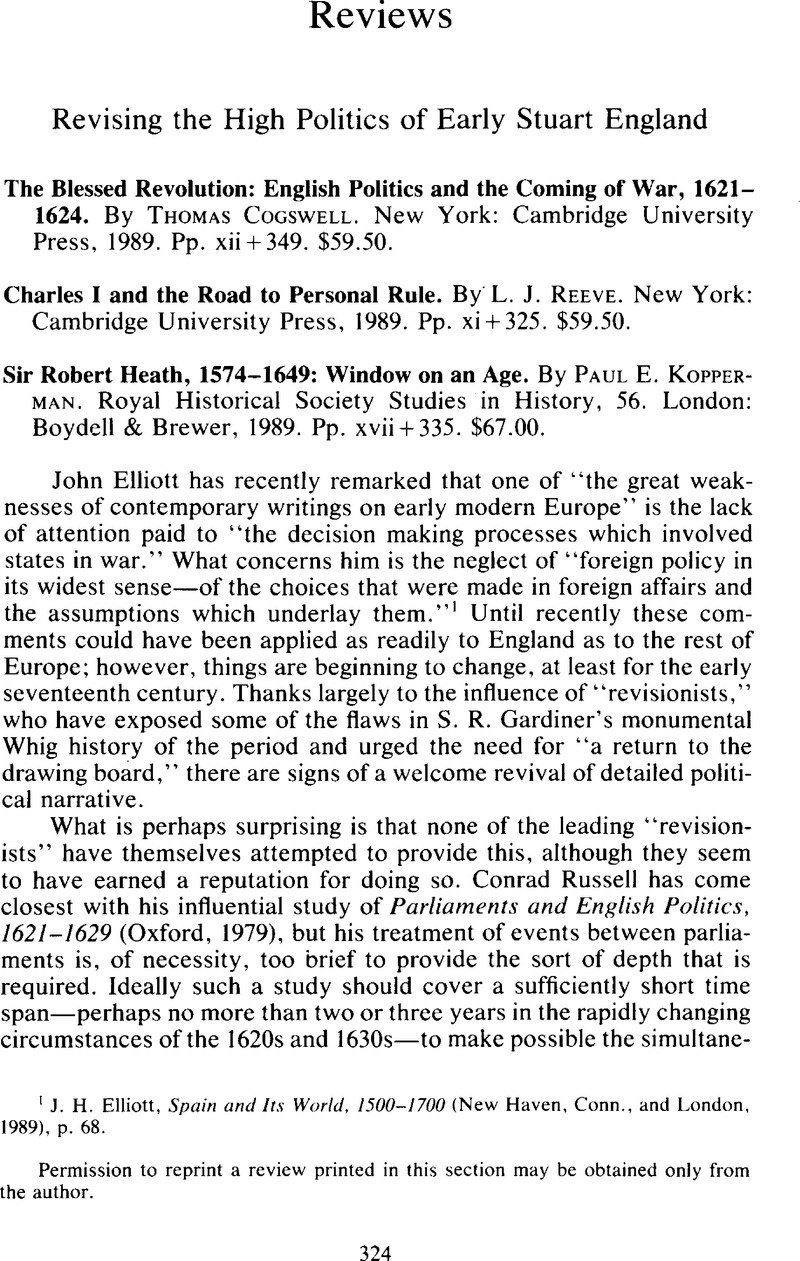No CrossRef data available.
Published online by Cambridge University Press: 10 January 2014

Permission to reprint a review printed in this section may be obtained only from the author.
1 Elliott, J. H., Spain and Its World, 1500–1700 (New Haven, Conn., and London, 1989), p. 68Google Scholar.
2 Stone, L., “The Revival of Narrative: Reflections on a New-Old History,” Past and Present, no. 85 (1979), pp. 20–21Google Scholar. It should be noted, however, that Stone is broadly in sympathy with this approach to political history. For a more negative assessment of the value of detailed political narrative, see Cannadine, D., “British History: Past, Present and Future,” Past and Present, no. 116 (1987), pp. 169–91Google Scholar.
3 Elton, G. R., “Parliament in the Sixteenth Century: Functions and Fortunes,” Historical Journal 22 (1979): 272–77CrossRefGoogle Scholar.
4 Ruigh, R. E., The Parliament of 1624 (Cambridge, Mass., 1971)Google Scholar; Adams, S. L., “Foreign Policy and the Parliaments of 1621 and 1624,” in Faction and Parliament, ed. Sharpe, K. (Oxford, 1978), pp. 139–72Google Scholar; Russell, C. S. R., Parliaments and English Politics, 1621–1629 (Oxford, 1979)CrossRefGoogle Scholar, chap. 3.
5 In the meantime, see his important discussion of the House of Commons and supply during the 1620s: Cogswell, T., “A Low Road to Extinction? Supply and Redress of Grievances in the Parliaments of the 1620s,” Historical Journal 33 (1990): 283–303CrossRefGoogle Scholar.
6 For the argument that the origins of “new counsels” are be seen earlier than this, during the period 1626–27, when Charles first showed his aversion to parliaments and resorted to the Forced Loan as a means of raising money, see Cust, R. P., The Forced Loan and English Politics, 1626–1628 (Oxford, 1987)Google Scholar.
7 Russell, , Parliaments and English Politics, pp. 49–53, 397–99Google Scholar.
8 This point is developed at greater length in Cust, The Farced Loan; Cust, R. P., “Charles I and a Draft Declaration for the 1628 Parliament,” Historical Research 151 (1990): 143–61CrossRefGoogle Scholar; Cust, R. P., “Charles I and Great Yarmouth: Anti-Puritanism and Urban Politics,” Historical Journal (in press)Google Scholar.
9 Quintrell, B., “Charles I and His Navy in the 1630s,” Seventeenth Century 3 (1988): 157–79Google Scholar.
10 Russell, C. S. R., The Causes of the English Civil War (Oxford, 1990)Google Scholar.
11 Prestwich, M., Cranfield (Oxford, 1960)Google Scholar.
12 Much of this paragraph is based on Cust, “Charles I and a Draft Declaration,” pp. 144–48.